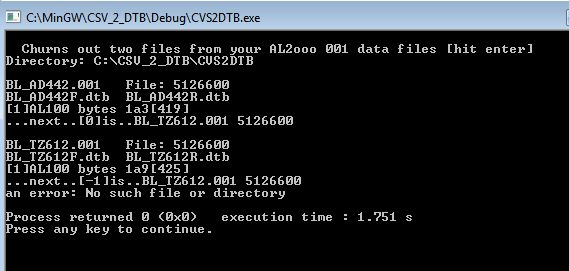Debug doesn't track error.
After displaying second file program seems to go into endless loop taking 25% of processor with no other output.
Code:/* 24/01/2017 09:40 */ #include <stdio.h> #include <sys\stat.h> #include <stdlib.h> #include <string.h> #include <time.h> #include <dos.h> #include <conio.h> #include <ctype.h> #include <io.h> #include <math.h> #include <dir.h> #include <errno.h> #include <process.h> #define uint unsigned int #define uchar unsigned char #define byte unsigned char #define ulong unsigned long FILE *outfileF, // to write DTB files *outfileR, *infile; uint iFdata[3000], /* DTB extracted data */ itemp[3000], iRdata[3000]; int main( void) { struct _finddata_t ffblk; intptr_t handle = 0; char *dir_buffer, cdir[64]; int ii = 0, in, i, iLen, iSum; char csFileF[14], csFileR[14]; /* corrected file names */ printf("\n Churns out two files from your AL2ooo 001 data files [hit enter]"); getch(); dir_buffer =_getcwd( (char *)&cdir, sizeof(cdir)); if( !dir_buffer) { printf("\n ! ERROR ! obtaining current disc directory!"); printf("\n .. any key .."); getch(); exit(-1); } printf("\nDirectory: %s\n", cdir); handle = _findfirst("*.001", &ffblk); if( handle == -i) { printf("\nNO FILES!\n"); exit(-1);} while( handle && !ii ) { // ii set by _findnext() if( !ii) { printf("\n%12s ",ffblk.name); for( i = 0x0; ffblk.name[i] != '.'; ++i ) csFileF[i] = csFileR[i] = ffblk.name[i]; csFileF[i] = csFileR[i] = 0; strncat(csFileF, "F.dtb", 5); strncat(csFileR, "R.dtb", 5); printf(" File: %i \n", handle); printf("%s ",csFileF); printf("%s\n",csFileR); infile = fopen(ffblk.name, "r"); if( infile ) { i = fseek( infile, 0x80L, SEEK_SET); if(!i) { in = fread(&iLen, 2, 1, infile); printf("[%d]AL100 bytes %x[%d]\n", in, iLen, iLen); } else { printf( "\n!!ERROR READING FILE!! %s\n", ffblk.name); fclose(infile); exit(-1); } } printf("...next.."); ii = _findnext(handle,&ffblk); printf("[%d]is..%12s %i\n",ii, ffblk.name, handle); if( ii == -1 ) printf("an error: %s\n", strerror(errno)); // exit(-1); } } // while( handle... _findclose(handle); return( 0); }/* ..end.. main() */







